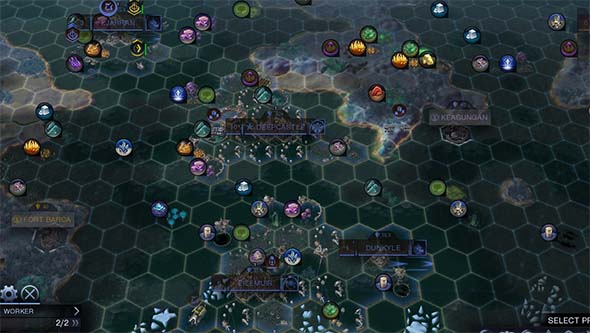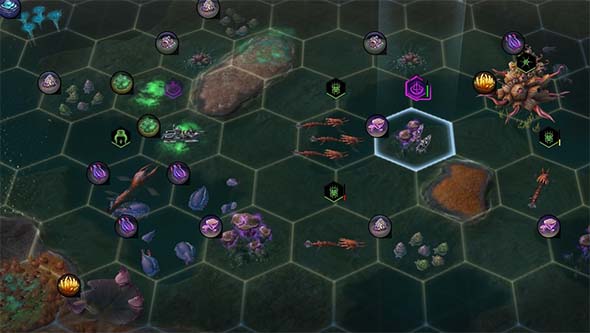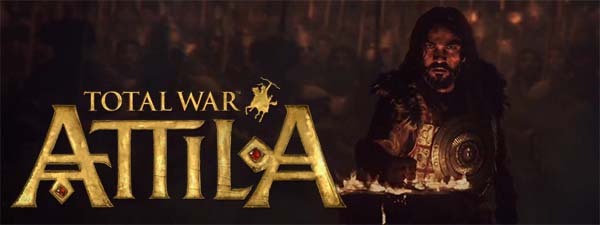
I'm starting to feel like quite the prognosticator. Earlier this year, I started tossing around the idea of Nomadic civilizations for future Civ games. Around the same time, Creative Assembly announced Attila: Total War. They had apparently come up with almost the same idea independently at the same time. Well, now the teams at Firaxis have also implemented a variation of my idea for their new expansion to Beyond Earth, called Rising Tide.
This expansion seeks to remedy several of the core complaints with the Beyond Earth game. In my original review for Beyond Earth, my two biggest complaints were that the game and its leaders lacked the personality and variety of Civilization V, and that it just didn't feel futuristic enough. Both of these complaints ended up being the major focus of the first expansion, which definitely helps to make Beyond Earth stand out a little bit from its more realistic counterpart.
So we sailed up to the sun, till we found a sea of green
One of Beyond Earth's biggest failings was its lack of creativity in using its futuristic setting to innovate gameplay. The game felt very much like a reskin of Civ V rather than a new game. A big part of this was that the map posed many of the same sorts of restrictions on players that the Civ V map did: mountains, canyons, and oceans were all obstacles either impassable by units or uncolonizable by cities.

Aquatic cities and civilizations help to separate Beyond Earth's futuristic setting from Civilization's historical roots.
Well now one of those restrictions has been lifted, and civilizations can build floating cities in the oceans. Such cities can even be moved in order to claim new tiles or to act as mobile military bases. This opens up some interesting (and sometimes silly) new strategic possibilities, but the whole mechanic feels a bit contrived to me. Moveable cities is something that I think can work very well in Civilization, but I just don't feel that Firaxis gave us much reason to ever need to move cities in this game. My proposal for nomadic civilizations was two fold: such a faction could mobilize its entire civilization right up to an enemy's borders during war; and it could also move in response to changing map conditions (migrating animal resources or climate change) during peace. Beyond Earth hits that first point by turning cities into massive aircraft carriers, but there aren't any mechanics in place to make the map a factor.
Fish and other harvestable sea creatures don't migrate, and other resources don't move. So if you aren't using your aquatic cities as mobile military bases, then there's never any real need to move them. And if you're not playing as the North Sea Alliance faction, then the cost to move a city can feel prohibitively expensive. The people at Firaxis seemed to have recognized this, and so they made it so that aquatic cities don't grow their borders based on culture. Instead, you must either buy new tiles or move the city itself in order to acquire adjacent tiles. But since moving takes valuable production time away from the city, I rarely find myself moving a city, and instead I just buy any tiles that I want.
Aquatic cities can be moved, and can act as mobile military platforms and aircraft carriers.
There are other pros and cons to aquatic cities, such as health benefits, faster virtue acquisition, and more profitable trade routes. You can also move the cities around to temporarily acquire resources that allow you to build specific resource buildings, but at the cost of possibly temporarily hurting your city's growth or production (and maybe even starving the city if you move away from food-generating tiles). So there's a lot to think about when build an aquatic or nomadic civilization, but it all feels kind of like ad hoc mechanics in order to make the mechanic seem more meaningful than it actually is. That isn't to say that mobile cities is a bad feature in Beyond Earth. It's perfectly functional, and can be fun to play around with. It just feels a little gimmicky.
Just look at the world around you, right here on the ocean floor
It certainly helps that the oceans themselves are a much bigger part of the game. The ocean isn't just divided into coastal tiles and empty ocean anymore. There's a whole host of new aquatic resources, and even the sea floor itself has different features. This definitely provides some incentive and reward to building floating cities, since the ocean can be a rich source of resources. The ocean tiles themselves can even be improved with a variety of new improvements (including basic farms and mines).

The oceans are alive with life and resources, giving reason to found aquatic cities.
Aliens are also active in the oceans. Sea creatures will build nests (just like their land counterparts), and there's a new alien creature called Hydrocoral that is stationary but which spreads across the ocean surface if left unchecked. Resource pods, artifacts, and quest triggers can all also be found in the ocean. So there's plenty to do in the water now, oceans feel more like a genuine part of the map rather than just dead space between continents, and the variety of features and resources in the ocean helps to make the world look more alien.
... [More]
da86c697-6def-4ade-b575-051869e1f38d|2|5.0
Tags:Sid Meier's Civilization, Civilization: Beyond Earth, Civilization: Beyond Earth: Rising Tide, Rising Tide, Firaxis, 2K Games, PC, Steam, strategy, grand strategy, turn-based strategy, science fiction, space, water, aquatic city, nomad, ocean, trench, submarine, diplomacy, affinity, alien, Civilization: Beyond Earth

A few months ago, I posted an article outlining some suggestion for unique civilization themes and abilities for a possible Sid Meier's Civilization VI game. In it, I proposed a unique characteristic for the Huns or Mongolians: that they be a true nomadic empire. The idea was that they would have traveling cities that allowed them to move their empire with their army and essentially occupy any unclaimed territory or territory vacated by defeated rivals. Well, the Creative Assembly had already beaten me (and Firaxis) to the punch with Total War: Attila (and apparently Firaxis is embracing the idea with Beyond Earth's first expansion). Total War: Attila has a feature almost identical to what I had conceived for the Huns and Mongolians in Civilization. I'm a fan of the Total War series as is, so I was going to play this game for sure. Of course, Creative Assembly running with an idea that I had independently conceived of only made me more curious to play the game.
Attila acts as sort of a sequel to Rome II. While that game was all about building up the Roman empire (or whichever empire you happened to select), Attila is all about tearing down those empires. But this is a fully stand-alone game (like Napoleon Total War was to Empire Total War), and does not require Rome II in any way.
Learning how to be a horde
The Prologue campaign in this game is brutal! It's like a Demon's Souls tutorial that is designed to kick your ass. I restarted it once before realizing that it was designed for the player to fail in order to teach the new migration feature.
This prologue acts as a tutorial for the new features and mechanics of the game, but it doesn't do a particularly good job of teaching these mechanics. It also doesn't go into much detail of the established features of the franchise (other than telling you that a feature exists, then making you click on the button to do it), so new players might find themselves completely turned off by the fact that they are having their asses handed to them and aren't being taught much about how the game actually works, or - more importantly - why they are failing so hard. Perhaps having two separate tutorial campaigns would have been advisable: one to teach basic Total War concepts of empire and army management; and a second tutorial campaign for experienced Total War players that just teaches the migration features.
The brutal tutorial concludes with the challenging, climactic, historical battle of Adrianople,
in which your Visigoths must hold off Emperor Valens' superior army until your cavalry arrives.
Playing as migratory hordes minimizes city management, but you do still have to develop infrastructure for your nomadic armies. Rebuilding conquered cities and defending your borders, however, is not an issue - which was always the most tedious part of the game anyway. You don't need defensive armies in your territory and are free to focus all your efforts on your eventual goal. This change works well with the requirement that all armies must be attached to generals, and is a big step up from Rome II. There were large chunks of Rome II's campaign in which I felt like I couldn't do anything because I had to camp out my armies in cities in order to replenish and improve public order. Since I was at the army cap, the campaign would stagnate because I couldn't build new armies in order to watch over my newly-conquered settlements while also pressing forward with my primary armies... [More]
da530405-0213-4b1a-93c4-503924d797fd|0|.0
Tags:Total War, Total War: Attila, Creative Assembly, Sega, PC, Steam, Attila, Attila the Hun, Huns, Rome, Western Roman Empire, Eastern Roman Empire, Constantinople, Byzantine Empire, Sassanid Empire, Europe, Goths, Visigoths, Ostragoths, Germanic tribes, Franks, Saxons, Vandals, strategy, turn-based strategy, real-time strategy, grand strategy, history, campaign, horde, migration, climate change, the Great Migration, steppe, Sid Meier's Civilization, war, nomad, siege

With Civilization V apparently at the end of its life cycle and unlikely to receive any more major updates or expansions, it's time to start looking to the future of the franchise: Civilization VI. Civ V was successful enough to spawn several spin-offs: Beyond Earth, Civilization Revolution 2 on mobile devices, Civilization World, and even a Civilization MMO. So it's reasonable to assume that if work hasn't already started on Civlization VI, then it will begin soon.
One of the things that I most love about Civ V is that each civ has unique powers that give them their own playstyles and flavors. The expansions (especially Brave New World) showed a lot of creativity with some of the civilizations. I hope that these design philosophies continue, and that we'll see some even more interesting gameplay variations in the new civilizations of Civilization VI.
To that end, I have a few ideas and suggestions for designs and themes for some of the common civilizations that are likely to appear in Civilization VI. I'll provide at least a unique abilility and at least two unique units / buildings / improvements, but I may also provide additional or alternative unique suggestions in case Firaxis decides to include even more variety and specialization. Since Civ VI will likely be a whole new game on a whole new engine, I can't give specific examples of the mechanics of these ideas. Instead, I'll try to focus on more broad concepts and maybe include examples based on Civ V's mechanics and features if relevant.
* NOTE: this post is a work-in-progress, and will probably be revised as I come up with additional ideas or clarifications. [More]
38b32f22-6121-4eec-82dd-ddc90cb4ce5d|0|.0
Tags:Sid Meier's Civilization, civilization, ability, unique, America, minuteman, Egypt, Nile, war chariot, Greece, city state, philosophy, hoplite, Huns, Mongols, nomad, Japan, Bushido, samurai, katana, dojo, ninja, Rome, road, legion, forum, Byzantium, cataphract, musketeer, immortal, MiG fighter, spitfire, Civilization III, Civilization IV, Civilization V, Civilization VI
|

| 12 | | | | | | | 60 | | 11 | | | | | | | 55 | | 10 | | | | | | | 50 | | 09 | | | | | | | 45 | | 08 | | | | | | | 40 | | 07 | | | | | | | 35 | | 06 | | | | | | | 30 | | 05 | | | | | | | 25 | | 04 | | | | | | | 20 | | 03 | | | | | | | 15 | | 02 | | | | | | | 10 | | 01 | | | | | | | 05 |
|